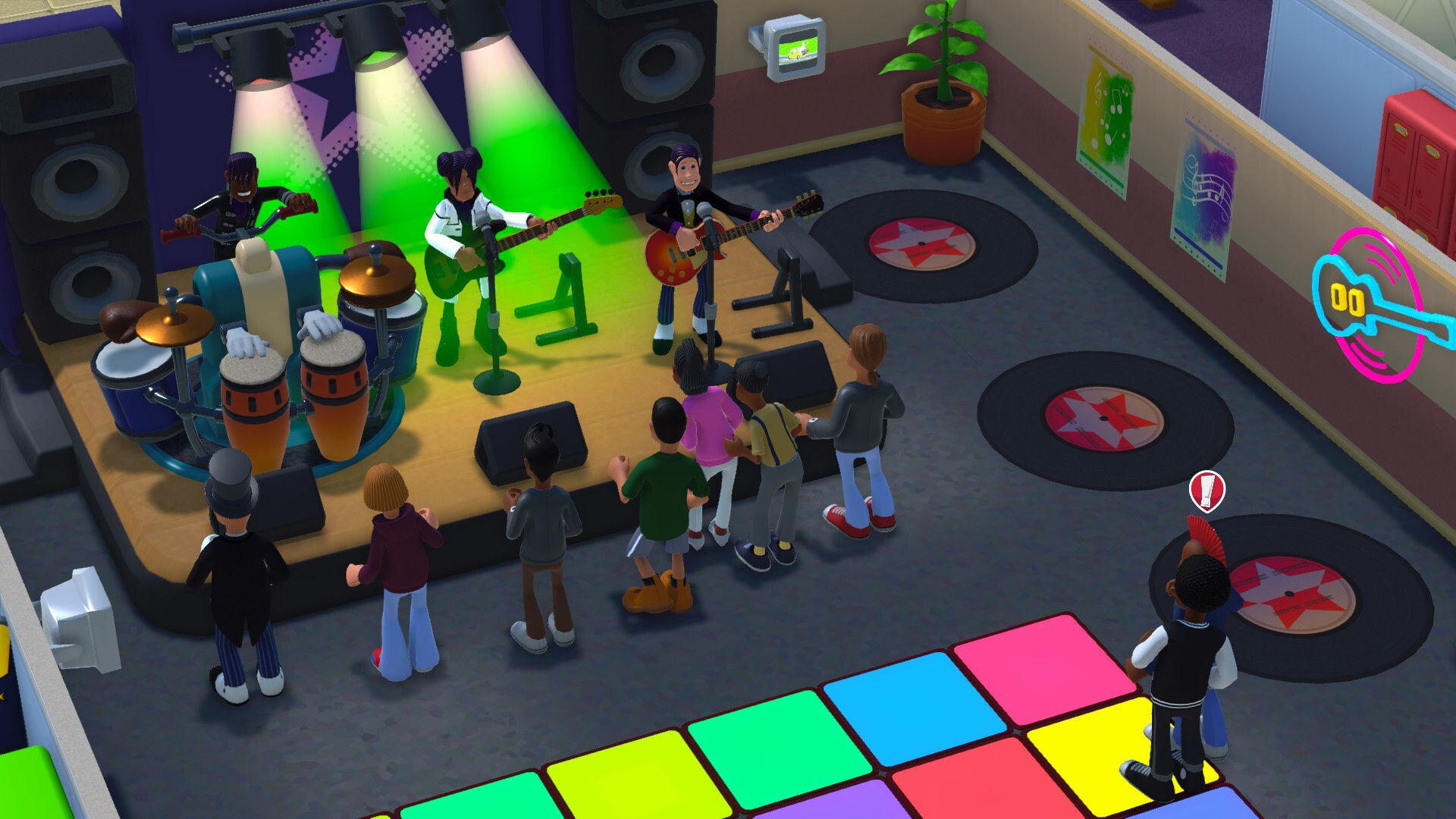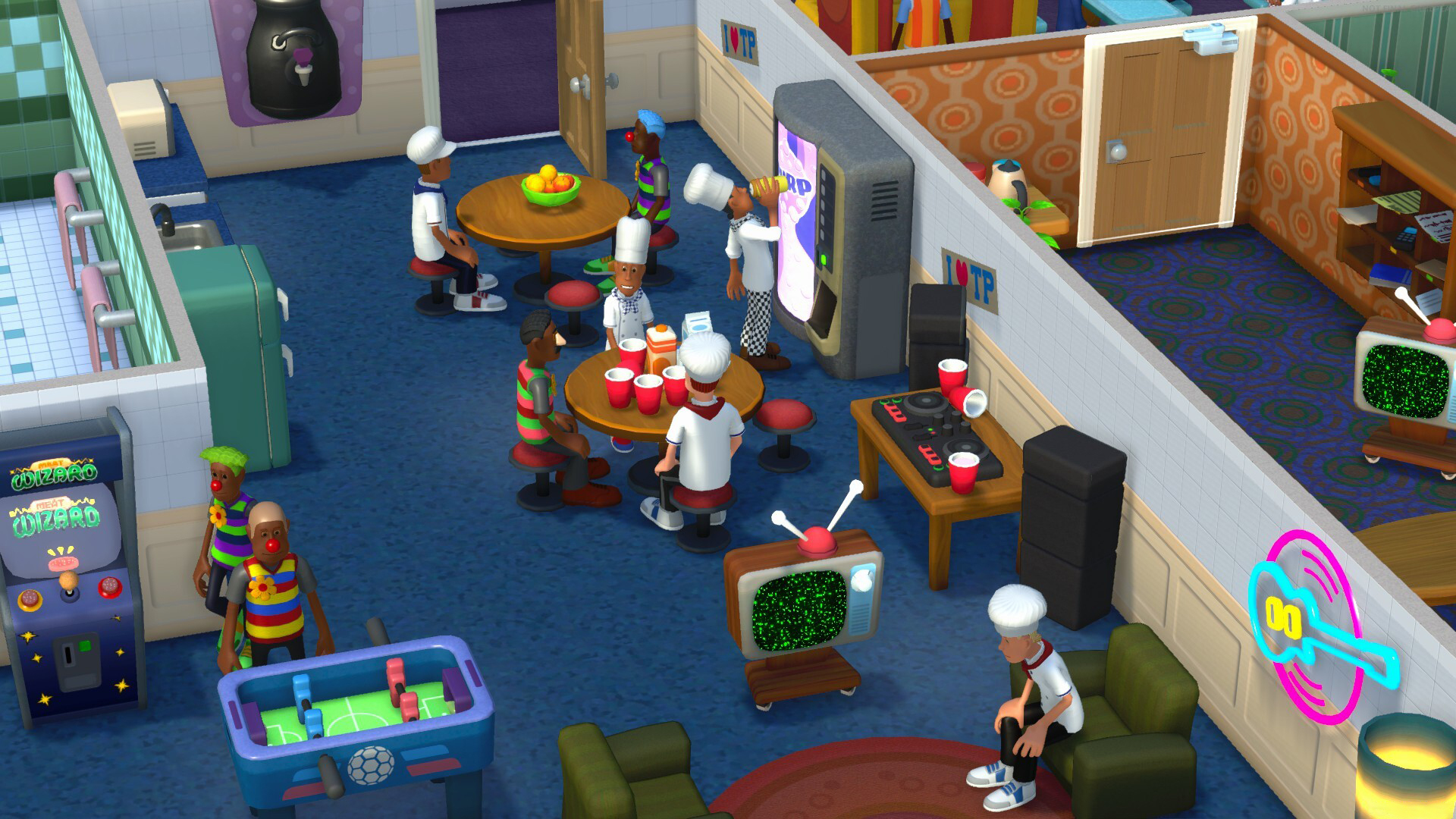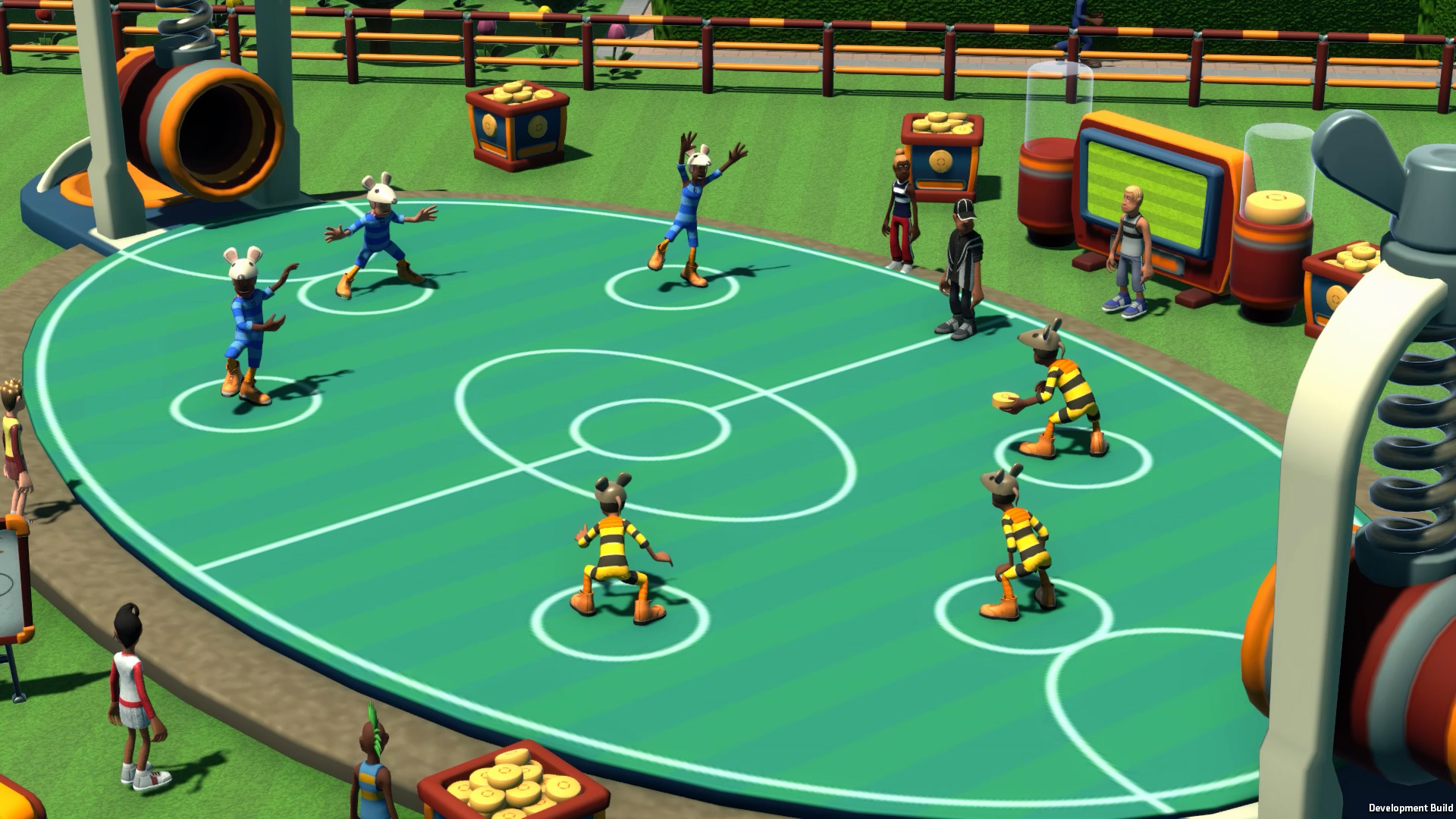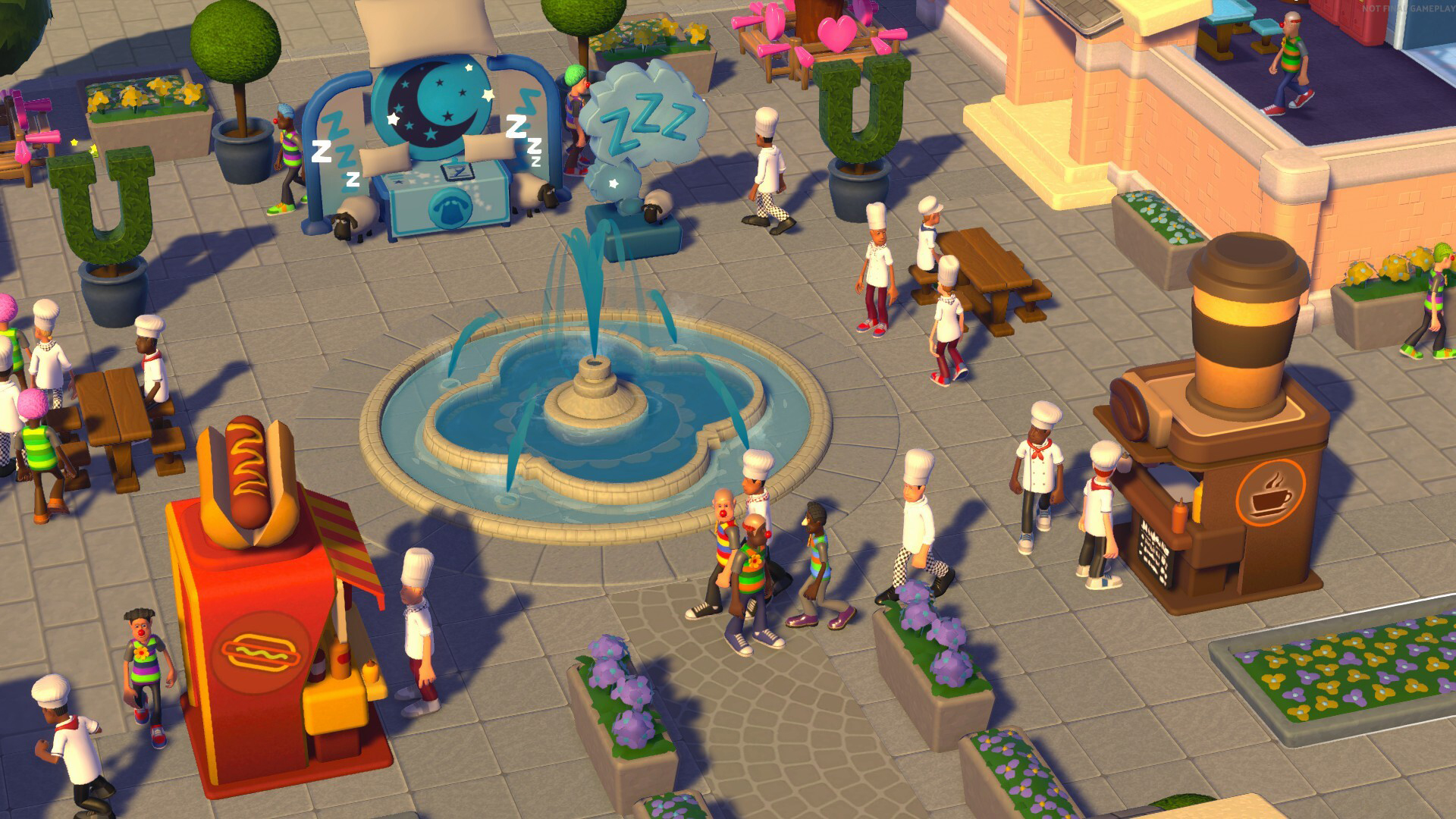
Homer Derp won’t fail university. Not if I can help it. I’ve invested too much time and energy into this shower-adverse, litter-dropping little cretin and by hook or by crook he’s not dropping out. Two Point Campus could burn down around him, but as long as he’s getting A’s in General Knowledge, I’ll be happy.
Am I being a helicopter parent of sorts? The kind that meets your freshman neighbors before you do? Maybe. I prefer to think of myself as a motivator. But Homer’s not making it easy. As his cheese-dusted fingers let slip yet another Cheesy Gubbins wrapper onto the floor – right next to a trashcan, no less – and he saunters past one of the many shower rooms I’ve built, his odor visibly evaporating from his body, I sigh. What does he want?
It’s this frustration that has tainted much of my time with Two Point Campus; frustration and, quite frankly, a bit of boredom. I was obsessed with its predecessor, Two Point Hospital, finishing every level before immediately going through them all again in order to gain three stars. But, with Two Point’s university-themed sequel, merely earning the one star needed to progress to the next campus feels like a chore. To the point that I’m now fixating on individual students like Homer Derp – setting my own challenges outside of the game’s parameters.
Two Point Hospital never offered the luxury of time. Instead, it was wall-to-wall chaos, each level able to turn on you in a second – curdling like milk left out on a hot day in a shared student kitchen. In trying to slow that pace, Two Point Campus has lost what made its predecessor so enjoyable: pressure.
Lessons learned

There are a number of changes Two Point Campus introduces that fans of Hospital will either find welcome or jarring. The UI has had a fairly extensive overhaul, with Campus built from the ground up for PC and console simultaneously. If, like me, you’ve got Hospital muscle memory and are playing on a console, it can take some time to get used to how this somewhat fiddly interface works.
Campus feels like it has more heart. Two Point Studios wants you to know your staff and students. Whereas in Hospital, I couldn’t have told you the name of a single turtle-headed patient or overworked doctor. Because frankly, I wasn’t in the business of caring.
My first hour with the simulator was plagued by accidental inputs. I mistakenly sold doors, and even whole rooms – pretty much everything I had placed. Eventually, it clicked, and I learned to appreciate that a double-press would sell an item. But, even with hours of play under my belt, I still find myself selecting the wrong menus or items because I haven’t quite wrapped my head around what feels like PC-priority controls.
Thankfully, there are plenty of unequivocal improvements too – like the ability to place items outside a building and to landscape the grounds, as well as increased customization options for rooms and staff. A range of relationship items like water coolers and picnic benches will either have students getting it on or simply shooting the breeze together. While each campus has its own individual theme, like magic, medieval, or straight-up partying, these new features let you take ownership of each Campus and, in my case, made me more invested in the students and staff.
Get daily insight, inspiration and deals in your inbox
Sign up for breaking news, reviews, opinion, top tech deals, and more.
The latter is perhaps the biggest change from Hospital to Campus, apart from the theme itself. Campus feels like it has more heart. Two Point Studios wants you to know your staff and students. Whereas in Hospital, I couldn’t have told you the name of a single turtle-headed patient or overworked doctor. Because frankly, I wasn’t in the business of caring.
That’s also what makes Campus a knottier concept, in my experience. In Hospital, you simply had to get the people in and out, while keeping them relatively happy (read: don’t let them die, ghosts are a real pain). In Campus, the welfare of the simulator’s characters is at the forefront. It’s easy to make Homer Derp go to class or spend time with a personal tutor, but it’s much harder to manage his health – both mental and physical.
It wasn’t something I expected from Two Point Campus – to be tasked with ensuring students got pastoral care when their academic experience became too much; when it turned out not to be quite what they thought it would be. Frankly, it’s too close to real life. Surely students aren’t having mental health crises in the game where an oversized cockroach mascot sometimes appears to flog burgers? Right?
But actually, it’s a breath of fresh air to see mental health services portrayed in a sim like this. In fact, Two Point uses Campus’s radio station as an instrument to take some well-aimed shots at administrators and the crippling cost of a university education, as well as the class divide generally. Bourgeois (and very out of touch) returning DJ Sir Nigel Bickleworth, for example, runs an Agony Aunt-like segment on his radio show – advising a student with a noise problem to simply go to the reading nook of the university tower. A reading nook? The best my uni had was a Student Union that looked like an abandoned McDonald's.
Miss my mummies

While Two Point Campus no doubt improves upon many thematic aspects of Hospital, it falters in one key area: pacing. The thrill for me in Hospital was that there was little respite from the waves of patients. You had to work under pressure, and try to fix issues as they happened. One minute you could be running a well-oiled machine, and the next see 20 patients hit by the Abominable Curse epidemic – a contagious disease that causes the infected to walk around like Mummies (the Ancient Egyptian kind). The hospital never closed, so you had to keep going until you completed all the challenges you’d been set.
Two Point Campus is much slower, with each academic year taking place over an in-game 12-month period (around 24 real-time minutes, according to the developer). During the summer break, you get a chance to build and prepare for the next influx of freshers; during the academic period, you have to keep students happy and their grades up – ideally taking them through their three years of schooling to graduation.
It’s no bad thing to spend more time deliberating over how to spend your often limited budget, or planning social events for students. But I miss that pressure. The tension that is here almost feels plastic. After all, if you don’t succeed this year then you always have next year, or the year after that. It’s perfect for those who want a more laid-back management sim, but that’s not me. I want to feel like failure is imminent, and so get the rush when I succeed. In Two Point Hospital I had countless setbacks; in Two Point Campus I never failed a level.
Pressure often leads to erratic decisions that often lead to chaos, and so the circle begins once more. Yet the worst thing that can happen in Two Point Campus is that one of my students gets upset and drop out. No one died, leaving a ghost to spew ectoplasm in the hallways, ultimately leading to someone slipping (something that regularly happened in Hospital). There wasn’t enough mayhem. The wackiness falls solely on the shoulders of the themed campuses and, of course, the fan-favorite radio DJs.
While some of Two Point Hospital's disc jockeys make a return, they’re joined by student radio wannabees trying their best to report seriously on ridiculous events – like the thieving of bones from a medical school. But neither the DJs nor the radio music are as memorable as that of Hospital, failing to provide any earworms to speak of. The tannoy, updating you on hospital goings on, is instead the main source of comic relief. Quips like, “No, your chicken should not be pink”, capture the university student experience and have me chuckling when they loop around. But the laughs are nowhere as frequent as I expected (or hoped) in this sequel.
Campus curse

Two Point Campus is – dare I say it – more of a run-of-the-mill management sim than Hospital. Due to its less pressured approach, Campus is missing the unpredictable factor that its predecessor had. There’s no urgency. If Hospital was a stressed-out final year student, Campus is definitely a hungover freshman. What results is a sim that generally feels more relaxed. For players like myself, this can be tedious – but it’s likely bliss for those who prefer being able to take the time to make important financial decisions or to watch their pupils grow over time.
If Hospital was a stressed-out final year student, Campus is definitely a hungover freshman.
The quality-of-life changes are plentiful, the attention to detail apparent and the charm undeniable. Throwback comments to Hospital made me feel like I was in a special club – the Two Point fans who could sing the Cheesy Gubbins jingle and quote nighttime DJ Harrison Wolff. But it no longer feels the same and, though it disappoints me greatly to say, never did bring me around.
When I finished Hospital, I immediately began again to chase the top grades, simply because I wanted to play more – I was scrambling to be the star student. With Campus, I think I’ll settle with a C+ and a beer.
An award-winning games journalist, with seven years of experience in games journalism and a degree in journalism from City University, London, Vic brings experience from IGN, Eurogamer, The Telegraph, VG247, Dot Esports and more to the TechRadar table. You may have even heard her on the radio or speaking on a panel, as she’s previously appeared on BBC Radio 4, BBC Radio 5, BBC Radio Ulster and more. Not only is Vic passionate about games, but she's appeared on both panels and podcasts to discuss mental health awareness. Make sure to follow her on Twitter for more.